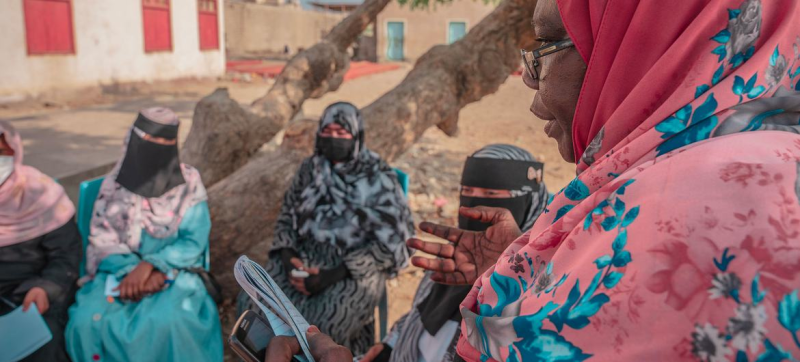- Experts see Tarique's political future on optimistic note |
- UN Chief Urges Leaders to Curb Warming, Protect Planet |
- Tk 3.38cr Project to Restore Sonadia’s Biodiversity |
- Global Emissions Fall Slowly, Experts Urge Renewables Push |
- Hurricane Melissa: UN Appeals $74M to Aid 2.2M in Cuba |
Women Still Largely Excluded From Peace Processes

Women in Sudan get together to discuss peace and human rights..
Around 676 million women lived within 50 kilometres of deadly conflict last year — the highest figure since the 1990s.
That is one of the key findings of the UN Secretary-General’s annual report on Women, Peace and Security (WPS), published on Monday.
The report highlights the role women play as peacemakers, describes how conflict affects them, and outlines the UN Secretary-General’s goals for advancing the WPS agenda.
“Women and girls are being killed in record numbers, shut out of peace tables, and left unprotected as wars multiply. Women do not need more promises — they need power, protection, and equal participation,” said Sima Bahous, Executive Director of UN Women.
25 years on
This year marks the 25th anniversary of the WPS agenda and Security Council Resolution 1325 — a landmark decision adopted at the turn of the century, affirming the importance of women’s participation in conflict prevention and peace processes.
Since its adoption, there has been growing consensus — supported by real-world examples from Colombia, Liberia, and the Philippines — that women’s participation makes peace agreements more likely and durable, according to the report.
However, problems persist. Implementation of WPS goals requires funding, and since last year’s report, women-led organisations have been facing greater financial constraints as conflict and crises put them at increasing risk.
Women still under-represented
Women can play an instrumental role in mediating conflict. As part of negotiations to end Yemen’s long civil war, women leaders managed to secure access to natural resources.
Data collected between 2020 and 2024 show that women’s representation as negotiators, mediators, and signatories in peace processes remains far below the UN’s target.
Last year, women made up only seven per cent of negotiators worldwide, and nearly nine out of ten negotiation tracks included no women at all, the report said.
Women were slightly more represented in mediation roles, averaging 14 per cent — yet two-thirds of mediation efforts still excluded women.
In the annual open debate on the WPS agenda earlier this month, UN Secretary-General António Guterres warned that while progress has been made over the past quarter century, “gains are fragile and — very worryingly — going in reverse.”
‘Unfulfilled promises’
Presenting the report on Monday, UN Women Deputy Executive Director Nyaradzayi Gumbonzvanda stressed that while civilian casualties among women and children have quadrupled compared to the previous two-year period — and sexual violence has increased — many women’s organisations working on the frontlines are scaling down or closing due to lack of funding.
“These numbers tell a story — one of unfulfilled promises,” she said.
Sarah Hendriks, the agency’s Policy Division Director, warned that if current trends continue, progress made on women’s rights over the past two decades risks being erased.
She reiterated the report’s call for binding targets and quotas for women’s participation, accountability for gender-based crimes and violence in conflict, and other key recommendations.
“The evidence is clear: when women lead and when their organisations are resourced, peace is more possible, recovery is faster, and societies are stronger,” she concluded.

